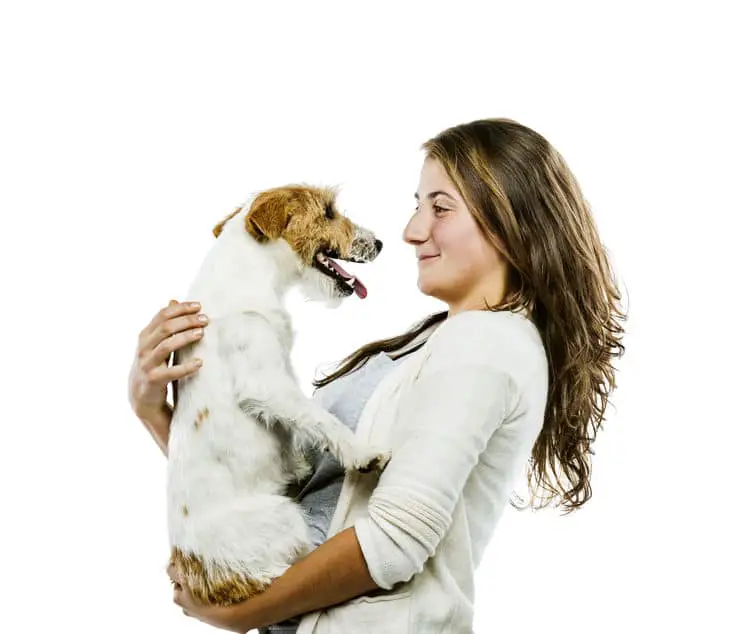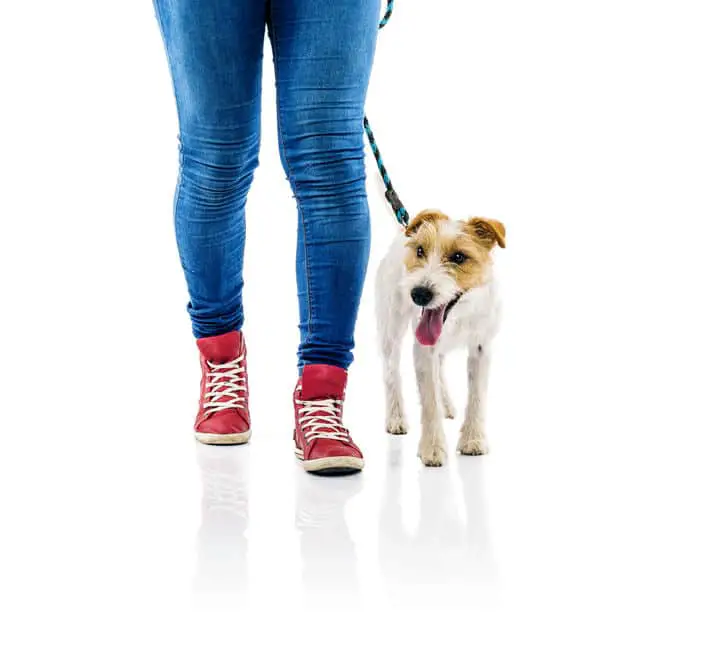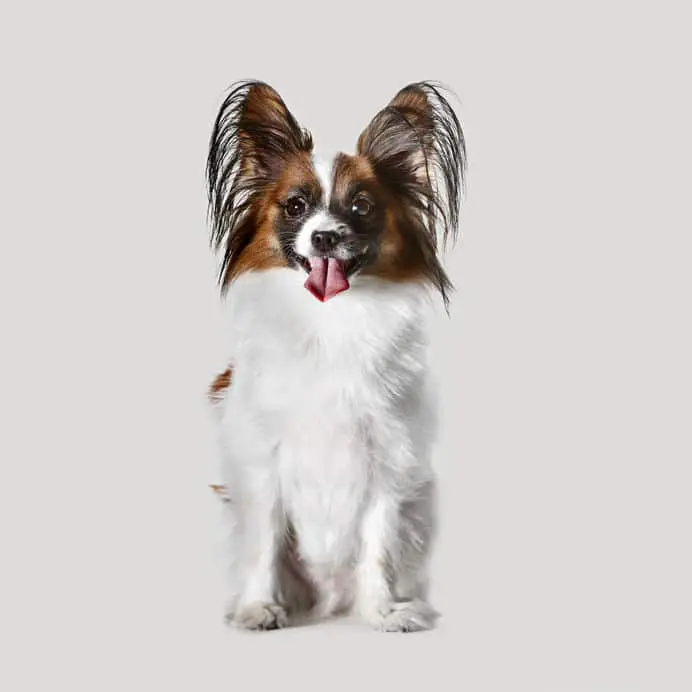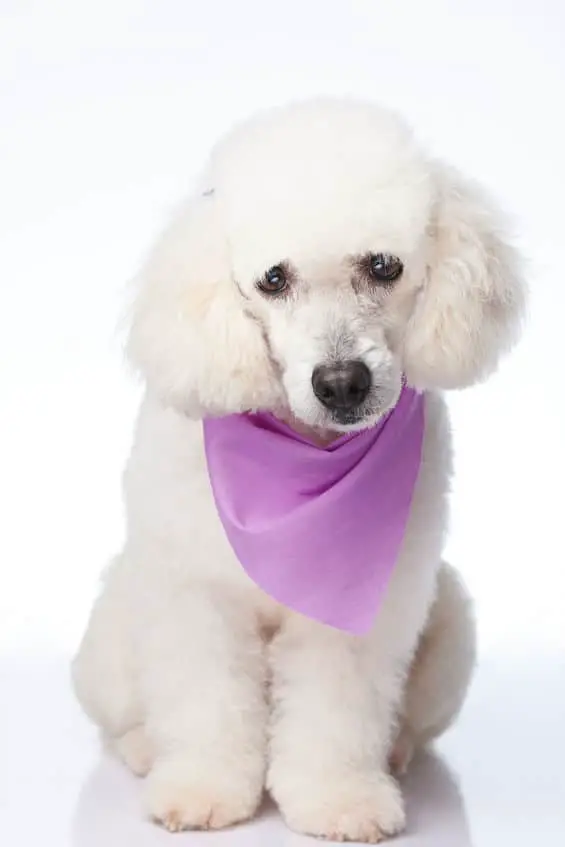Dogs have been found to be capable of abilities way beyond their regular routines of just being our lovable companions, they can be service animals as well, providing aid to people in need; be it psychological, hearing, seeing, or moving aid.
Dogs come in various sizes and shapes, possessing various abilities, that being said, can small dogs be service dogs?
Yes, small dogs can become service dogs, but, due to their size, they may not be the right choice for certain tasks that involve guiding and mobility, otherwise, they are well suited to be service dogs.
These tasks and disabilities are unique in their nature and in this blog post, I will be explaining what they are.
I will also be explaining what a service dog is, types of service dogs, the various types of disabilities that require certain specific abilities from a service dog, and so on.
Let’s get started.
What is a Service Dog?
According to the United States Department of Justice’s Disability Rights Section document entitled ‘ADA Requirements: Service Animals’, dated July 12, 2011, which states, “Service animals are defined as dogs that are individually trained to work or perform tasks for people with disabilities.”
The key phrase to note as regards to service dogs is, “they are trained to aid a person(s) with disabilities”.
Dogs are not naturally, without any training, capable of being service dogs.
Service Dogs are able to efficiently carry out commands and with discipline, also they are able to put their senses (sight, smell, and hearing) to great use in service to those they are aiding.
Since the 1920s, where the German Shepards were used as a Seeing Eye Dog for blind people, they have evolved and expanded their abilities.
In the last decade, service dogs have been rapidly adopted by people with disabilities to act as a companion and as well as helpers.
Difference between Service Dogs and Emotional Support Dogs
There are confusions surrounding the difference and similarity between Service Dogs and Emotional Support Dogs.
Unlike Service Dogs, Emotional Support Dogs are ‘dogs whose sole function is to provide comfort or emotional support’, this is according to the Americans with Disabilities Act (ADA).

A Service Dog requires specific task training that “must be directly related to the person’s disability”
The Americans with Disabilities Act also consider Service Dogs as working dogs, not as pets.
Another important difference between a Service Dog and Emotional Support Dog is that the access rights of an Emotional Support Dog are limited when compared to that of a Service Dog.
Examples of this can be seen on the table below.
| Access Scenario | Service Dogs | Emotional Support Dogs |
|---|---|---|
| Access to certain public facilities | Yes | No (Check your state, county, and city governments for information concerning the permitted and disallowed public access for ESAs.) |
| Access to Housing that don’t allow Dogs | Yes | No * |
| Access to cabin on commercial air travel with your dog | Yes | No * |
Therapy Dogs are on a different category as well and do not qualify, under Americans with Disability Act, to be Service Dogs.
A therapy dog is usually used to bring comfort and cheers to folks at the hospital, stressed out and anxious individuals at the airport, residents of an assisted living center amongst other places.
They are usually friendly, well trained and sociable dogs.
Types of Service Dogs
Due to the ever-growing abilities of a service dog, there have various tasks being performed by service dogs, which used in the categorization of service dogs.
The various types of service dogs are based on what tasks they are trained and charged with executing and they include:
- Guide Service Dogs
- Mobility Service Dogs
- Hearing Service Dogs
- Medical Alert Service Dogs
- Psychiatric Service Dogs
Guide Service Dogs
Guide service dogs help visually impaired or legally blind people to navigate and move around their environment.
They aren’t to be used as a GPS, they take directional cues from their handler and would intelligently help their handler avoid obstacles and hazards they can’t see, such as drainage holes src.
Guide service dogs are not to be petted when the dogs are on their special harness as it could distract them from the task at hand.
Mobility Service Dogs
Mobility service dogs help people who have an issue with their balance or mobility. The individuals tend to be in a wheelchair, use a walking cane, or any other walking device.
Hearing Service Dogs
Hearing service dogs help people with difficulty hearing or deaf, to alert them to important sounds in their immediate environment.

Medical Alert Service Dogs
Medical alert service dogs help alert people with underlining health issues to the possible reoccurrence of their health issues, such as an individual suffering from seizures about to experience another seizure attack or help them get help.
Another situation could be, alerting an individual who suffers from allergic reactions of possible allergens in his/her immediate environment.
Psychiatric Service Dogs
Psychiatric service dogs help people with some “invisible disabilities” such as Post Traumatic Stress Disorder (PTSD), Obsessive-Compulsive Disorders, or Schizophrenia in mitigating and reducing possible stress triggers amongst other things.
Service Dog roles a small dog is and isn’t suitable for.
Being a service dog could be difficult for small dogs due to their size, which becomes a limiting factor in the execution of certain tasks, but can also be a positive feature for certain situations.
Some “unsuitable” service dog roles for small dogs to execute include:
- Mobility Sevice Dogs: Unlike larger dogs, smaller dogs do not have the necessary body mass and strength to pull or push a wheelchair. For example, a Pomeranian can’t pull a wheelchair with a person in it.
- Guide Service Dogs: Due to the nature of the guide dog’s task, which is to aid a visually impaired individual to safely navigate his environment, a small dog would become more or less incapable of truly steering a human away from danger quickly enough.
Now, we have eliminated the service dog roles not suitable for small dogs, lets take a look at those that are “well suited” for a small dog.
These roles do not have anything to do with their size, strength nor physical abilities and they include:
- Medical Alert Service Dogs: Small dogs are well suited to serve as medical alert dogs as their physical attribute isn’t important but their great sense of sight, sound, and smell is.
They can be trained to sniff for cancers in sweat samples, breath, tissue, and even urine. - Hearing Service Dogs: Small dogs are also well suited to be hearing service dogs. They can be trained to stay alert and subsequently alert their owner to important sounds.
- Psychiatric Service Dogs: They play a great role in preventing and reestablishing calm in various mental and psychological disability cases.
According to a recent University of California, Davis, study, Psychiatric service dogs were the fourth most common type of service dog placed by facilities in the United States in 2013 and 2014.
5 Small dogs that make good Service Dogs
We have established that certain service dog roles might not be suitable for a small dog, but, we have also noted the service dog roles well suited for small dogs.
Some criteria that are important to look out for when picking a breed to be trained as a service dog include:
- Confidence: In the assistance of people with anxiety, a fearful dog could escalate or trigger an anxiety attack, and as such confidence is a required trait.
- Calm: A non-aggressive dog makes for a great service dog as being calm in unnerving situations is a necessary trait a service should possess.
- Intelligence: This, in my opinion, is arguably the most important factor to consider when picking a service dog. The ability to learn new things with ease is a great characteristic a service dog should possess.
- Good Health: A service dog must be of good health and have no underlying illness that may interrupt their ability to perform their tasks.
Listed below are the various small dog breeds that make good service dogs.
- Papillon
- Poodle (Miniature and Toy)
- Chihuahua
- Russian Tsvetnaya Bolonka
- Shetland Sheepdog
Papillon
Robust, happy, intelligent, agile, alert, eager to please, and temperamentally suited for work, a Papillon is an amazing choice for a service dog.

Papillons are perfect for people with hearing loss, diabetes, and epilepsy amongst other medical conditions.
Miniature and Toy Poodle
Poodles are extremely intelligent, easy to train, active, alert, and eager to please.

They are a versatile dog breed and can be trained to perform a variety of tasks such as scent training to help detect some specific types of illnesses.
Chihuahua
Chihuahuas are intelligent toy breeds with a big-dog attitude. Their tiny size does not negate their ability to efficiently perform certain tasks.
They are charming, graceful, and can be trained to be either a Psychiatric Service Dog or a Hearing Service Dog.

Russian Tsvetnaya Bolonka
The Russian Tsvetnaya Bolonka is a calm, intelligent, independent, intensely loyal, sweet, and loving small dog that is eager to please.

Due to their clever nature, the Russian Tsvetnaya Bolonka can be trained as a great Psychiatric and Hearing Service Dog.
Shetland Sheepdog
This quick, obedient, alert, energetic, and extremely intelligent small dog is a great candidate to consider for a Service Dog.

Originally bred for herding, the shetland sheepdog is robust, tough, and great at tracking. They are a great option to consider if you need a Hearing, Psychiatric or Medical Alert Service Dog
Can you train your small dog to be a Service Dog?
The Americans with Disability Act do not require a Service Dog to be professionally trained and considering how pricey it is and how long it takes to get a Service Dog, training your small dog seems to be the obvious choice.
So can you train your small dog to be a Service Dog?
Yes, an individual with disabilities can train their own dog by themselves to be a Service Dog according to the American with Disability Act.
There are a couple of things you need to do and take into considerations before deciding if your dog will be a perfect candidate for the role of a Service Dog.
These include its temperament, health, intelligence, and foundational training.
An aggressive, ill-mannered dog has to be retrained before it can be considered for a Service Dog role.
Training your small dog to be a Service Dog
In the quest to train your own dog to become a service dog, there are certain foundation skills they must learn first.
Skills like being able to go potty upon command in various locations. Most dogs tend to be picky about where and when they go potty if not properly trained.
Your dog has to be socialized with the aim of having it be familiar and not startled by new people, sound, or locations while on a task, keeping its focus right on you.
Then, your dog needs to be trained to perform those specific tasks you need assistance with.
A great place to get resources and guidelines on the necessary foundational skills your dog would need is at the American Kennel Club’s Canine Good Citizen program.
The International Association of Assistance Dog Partners (IAADP), (http://www.iaadp.org) is also a place to get great resources on training your dog on the foundational skill required for service.
I must add that it is important to get professional help if you have no prior experience training dogs.
Finding a Service Dog
If training your own dog isn’t an option because you can’t or don’t own a dog, there are various places you can go to, to find a service dog.
There are various professional service dog training organizations located in the US, working to train dogs to perform specific tasks as regards to the needs and requirements of the person with the disability.
It is important to note that the cost of training service dogs could exceed $25,000, this unfortunately doesn’t minimize the number of people on various waiting lists to get a service dog.
Some organizations actually offer to help disabled people that can’t afford a service dog with financial aid or procure one at no cost to the individual.
Beware of fake trainers and organizations claiming to offer Service Dog training, before parting with your money, do the necessary researches and investigations.
Can I pretend my dog is a Service Dog?
It is an unfortunate thing to know people pretend their dog is a service dog and this is often done for the purpose of getting their dogs into places they are not allowed to be in.
Yes, you can pretend your dog is a service dog, but I won’t advise you to do such because there are legal consequences to that action. Not to mention the fact that it invariably abuses the laws created to help people with actual disabilities.
Various states and counties are enacting laws to prevent the misrepresentation of a pet as a service dog and penalties can range from a fine to hours of community service.
Summary
In summary, small dogs are oftentimes limited by their size and physical abilities but in the same vein, they excel and are no different from larger dogs when performing certain tasks.
They also come with their unique advantages over a larger dog, for example, having a large dog in a commercial flight could pose certain problems, whereas, a small dog could neatly fit into your laps or in-between your feet.
The Papillon, Chihuahua, Shetland Sheepdog, Russian Tsvetnaya Bolonka and Poodle (miniature and toy), are some of the best small dog breeds that can make a good service dog.
So, if your disability does not have a size requirement, you might as well consider small dogs to fill those needs.

